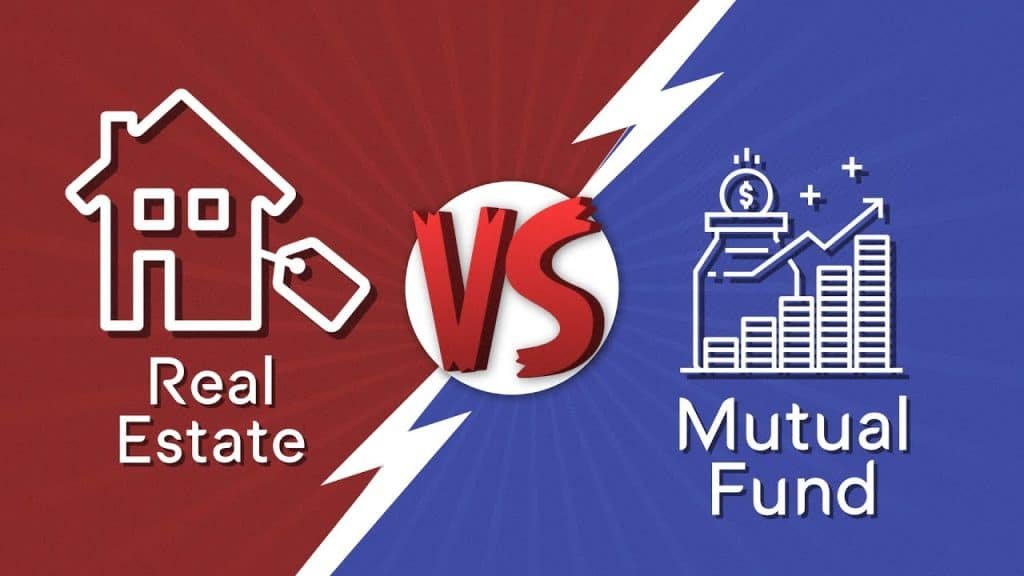Are You Want to Know More Information on the Real Estate vs Mutual Funds? Then, you must read this blog post. Let’s get into detail about the latest blog post – Real Estate vs Mutual Funds– What is the Best Profit Investment
1. Mutual Funds: Diversification and Professional Management
Mutual funds pool money from multiple investors to invest in a diversified portfolio of stocks, bonds, or other securities. This diversification helps spread the risk across various assets, reducing the impact of any individual investment’s performance. Professional fund managers handle the investment decisions, saving investors from the hassle of active management.

2. Real Estate: Tangible Assets and Potential Appreciation
Real estate investments involve purchasing physical properties, such as residential homes, commercial buildings, or land, with the goal of generating income or capital appreciation. Investors can rent out or sell tangible assets in real estate, potentially providing them with a steady stream of rental income and long-term value appreciation.

3. Liquidity and Accessibility
Mutual funds are generally more liquid than real estate investments. Investors can buy or sell mutual fund shares at the end of each trading day at the current net asset value (NAV). Real estate, on the other hand, is less liquid and requires time and effort to sell. Additionally, mutual funds are easily accessible through brokerage accounts, while real estate often requires significant upfront capital and property management responsibilities.
4. Risk and Volatility
Mutual funds are subject to market risks and fluctuations. The value of the fund’s investments can rise or fall based on market conditions, impacting the overall value of the investment. Real estate investments can also be influenced by market conditions, but they tend to be less volatile compared to stocks and bonds. Factors such as location, property market trends, and economic conditions can affect real estate investments.

5. Returns and Income Potential
Mutual funds offer the potential for capital appreciation through the growth of the underlying securities. Additionally, some mutual funds distribute dividends or interest income to investors. Real estate investments can provide rental income, which can be a reliable source of cash flow. Moreover, real estate has the potential for property value appreciation over time, which can lead to substantial returns when selling the property.
6. Maintenance and Costs
Investing in mutual funds typically incurs lower transaction costs and ongoing management fees. The expenses are generally transparent, making it easier to assess the impact on overall returns. Real estate investments, on the other hand, involve various costs such as property maintenance, insurance, property taxes, and potential renovation or repair expenses. These costs should be factored in when evaluating the potential returns of real estate investments.

7. Conclusion:
The decision to invest in mutual funds or real estate depends on various factors, including personal financial goals, risk tolerance, and investment preferences. Mutual funds provide diversification, professional management, and liquidity, while real estate offers tangible assets, potential appreciation, and rental income.
Also, Read Our Latest Blog Posts:
- The New Evolution of Telangana Secretariat and The Tallest Ambedkar Statue: Symbol of Equality and Justice
- A Wonderful Drive Trip On Outer Ring Road, Hyderabad
- Brief Info of Regional Ring Road, Hyderabad
- Exploring Hyderabad’s Mobility Valley: The Hub of Innovation and Connectivity
- Do You Know 13 Myths About HMDA Master Plan?
- Properties In Hyderabad
- Agriculture Land Near Hyderabad
- Villas Near Hyderabad
Frequently Asked Questions
Ans: Yes, Real Estate is a Better Investment.
Ans: Yes, you can invest in international markets through mutual funds.
Ans: The main difference between mutual funds and real estate lies in the nature of the investments and the potential returns they offer



